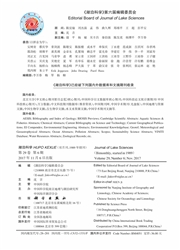

 中文摘要:
中文摘要:
以贵州省两个高原湖泊(红枫湖和百花湖)为例,利用颗粒态有机物稳定氮同位素比值(δ^15NPOM)的季节及水体剖面变化反映揭示了湖泊氮源变换以及内部生物地球化学作用,为研究湖泊系统氮的循环转化提供有用信息.结果发现:红枫湖表层颗粒态有机物的δ^15N变化范围是3.7‰-14.9‰;百花湖表层颗粒态有机物的δ^15N变化范围为1.3‰-8.7‰,红枫湖在冬季(2月)和夏末秋初(9月)出现高值;百花湖则在冬季(2月)出现最低值,夏末秋初(9月)出现高值.红枫湖δ^15NPOM值的季节性变化规律恰好与无机氮源的δ^15N值的变化规律一致,冬季高δ^15NPOM值的原因是其枯水期受工业废水中富含。5N的无机氮源的影响,而春季低δ^15NPOM值的原因则是受内源硝化作用产生的富含^14N的无机氮源的影响.百花湖冬季δ^15NPOM值低的原因是受生活污水中具有较低δ^15N值的有机颗粒的影响.同时,湖泊水体剖面δ^15NPOM和C/N比值相结合可以示踪湖泊系统内部特殊的生物地球化学过程.
 英文摘要:
英文摘要:
The stable nitrogen isotopic ratios of particulate organic matter (δ^15NPOM) was used to elucidate the seasonal variation and vertical characteristics of the different dissolved inorganic nitrogen sources and autochthonous biogeochemistry processes in two lakes (Hongfeng and Baihua) in Guizhou Province, China. The δ^15N values of surface POM seasonally varied from 3.7‰ to 14.9‰ in Lake Hongfeng and from 1.3‰ to 8.7‰ in Lake Baihua. It indicated that source of POM was greatly varied in these two lakes during study period. In Lake Hongfeng, the higher δ^15NPOM values appeared in winter (February, 2004) and summer (September, 2003). The highest δ^15NPOM values in winter were attributted to the input of high contents and ^15N-enriched inorganic nitrogen from industry wastes. During spring, the δ^15NPOM values decreased when phytoplankton uptake ^14N-enriched inorganic nitrate generated by nitrification in the interior Lake Hongfeng. The variation of δ^15N values in surface POM coincided well with the variation of δ^15N values of inorganic nitrogen sources. It suggestted that the variation of δ^15NPOM mainly influenced by inorganic nitrogen sources, which might resulted from the impact of allochthonous human activities. In Lake Baihua, the higher values of δ^15NPOM appeared in summer (September, 2003) while the values were low during winter season. These high and low values were possibly aroused by the growth of primary production and large ^15N-depleted organic particles input from sewage respectively. In addition, the combination of δ^15NPOM and C/N values in the vertical profile can be used to trace some special biogeochemistry processes in lacustrine ecosystem.
 同期刊论文项目
同期刊论文项目
 同项目期刊论文
同项目期刊论文
 Antimony, arsenic and mercury in the aquatic environment and fish in a large antimony mining area in
Antimony, arsenic and mercury in the aquatic environment and fish in a large antimony mining area in Capillary electrophoresis profiles and fluorophore components of humic acids in Nebraska corn and Ph
Capillary electrophoresis profiles and fluorophore components of humic acids in Nebraska corn and Ph Antimony speciation and contamination of waters in the Xikuangshan antimony mining and smelting area
Antimony speciation and contamination of waters in the Xikuangshan antimony mining and smelting area Characterization of Nanming River (southwestern China) sewerage-impacted pollution using an excitati
Characterization of Nanming River (southwestern China) sewerage-impacted pollution using an excitati Vertical Distributions of Plutonium and 137Cs in Lacustrine Sediments in Northwestern China: Quantif
Vertical Distributions of Plutonium and 137Cs in Lacustrine Sediments in Northwestern China: Quantif Characteristics and distribution of low molecular weight organic acids in the sediment porewaters in
Characteristics and distribution of low molecular weight organic acids in the sediment porewaters in Vertical distributions of 239+ 240 Pu activity and 240 Pu/239 Pu atom ratio in sediment core of Lake
Vertical distributions of 239+ 240 Pu activity and 240 Pu/239 Pu atom ratio in sediment core of Lake Determination of plutonium isotopes in freshwater lake sediments by sector-field ICP-MS after separa
Determination of plutonium isotopes in freshwater lake sediments by sector-field ICP-MS after separa Phosphorus Composition in Sediments from Seven Different Trophic Lakes, China: A Phosphorus-31 NMR S
Phosphorus Composition in Sediments from Seven Different Trophic Lakes, China: A Phosphorus-31 NMR S Zeolite and fungi's flocculability of simulated wastewater containing heavy metal ions or phosphorus
Zeolite and fungi's flocculability of simulated wastewater containing heavy metal ions or phosphorus Characterization of dissolved organic matter fractions from Lake Hongfeng, Southwestern China Platea
Characterization of dissolved organic matter fractions from Lake Hongfeng, Southwestern China Platea 期刊信息
期刊信息
